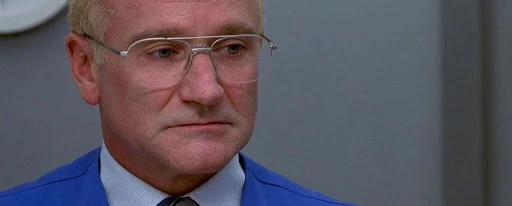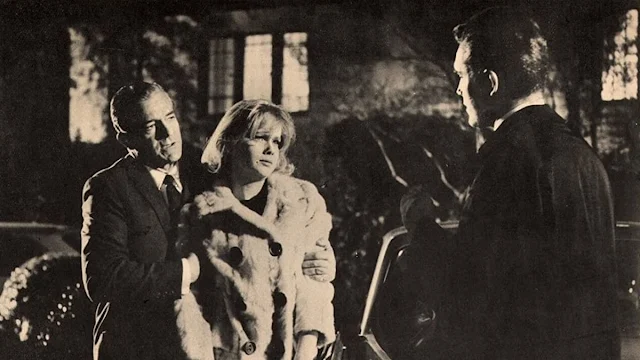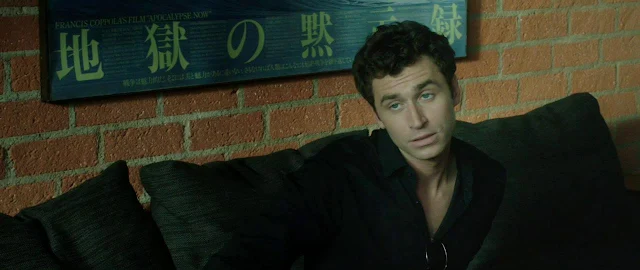Robin Williams gives a fine performance in One Hour Photo, but it remains just that: a performance, a tamping down of his familiar manic presence into the persona of the repressed, furtive Sy Parrish. He works in the photo processing department of SavMart, a vast and impersonal big box store. He lives alone, and his chief human contact is with his customers, who bring him their rolls of film to be developed. Their snapshots give him a glimpse into the lives of people who have families and children and celebrate events like weddings and birthdays. He also gets a glimpse of the secret lives of people, who bring in shots revealing their sexual proclivities, but he chooses to concentrate on the happy families, especially the Yorkins: the beautiful Nina (Connie Nielsen), her handsome husband, Will (Michael Vartan), and their cute 9-year-old son, Jakob (Dylan Smith). His admiration for the Yorkins grows into an obsession, and from that writer-director Mark Romanek spins the plot. One Hour Photo is supposed to be a thriller, in which we watch uneasily as Sy's obsession curdles into something malevolent. But by showing us Sy talking to the police at the start of the film, he deprives us of that surprise. There's a slackness in the narrative that works against the suspense, and Sy's breakdown and eruption into violence feels less like an integral part of the character than a plot device. Romanek also gets distracted into making a satiric point about the soullessness of the megacorporate entities embodied by SavMart, turning the store manager (Gary Cole) into the villain who pushes Sy over the edge. For many people, however, watching Williams perform is enough to overcome the movie's flaws.
A blog formerly known as Bookishness / By Charles Matthews
"Dazzled by so many and such marvelous inventions, the people of Macondo ... became indignant over the living images that the prosperous merchant Bruno Crespi projected in the theater with the lion-head ticket windows, for a character who had died and was buried in one film and for whose misfortune tears had been shed would reappear alive and transformed into an Arab in the next one. The audience, who had paid two cents apiece to share the difficulties of the actors, would not tolerate that outlandish fraud and they broke up the seats. The mayor, at the urging of Bruno Crespi, explained in a proclamation that the cinema was a machine of illusions that did not merit the emotional outbursts of the audience. With that discouraging explanation many ... decided not to return to the movies, considering that they already had too many troubles of their own to weep over the acted-out misfortunes of imaginary beings."--Gabriel García Márquez, One Hundred Years of Solitude
Search This Blog
Saturday, August 3, 2024
One Hour Photo (Mark Romanek, 2002)
Friday, August 2, 2024
25th Hour (Spike Lee, 2002)
Spike Lee's 25th Hour is a "day in the life" movie, and a very good one. The day is the last one of freedom for Monty Brogan (Edward Norton) before he goes to prison for seven years. He spends it with his girlfriend, Naturelle (Rosario Dawson), his friends Jacob (Philip Seymour Hoffman) and Frank (Barry Pepper), and his father (Brian Cox), and also makes a visit to the Russian mobsters who got him into the business of pushing drugs. It's also one of Lee's best films, less celebrated than Do the Right Thing (1982) or Malcolm X (1992), but worthy of being mentioned in their company. The only reservation I have about the movie is that Lee doesn't let his powerhouse cast bring their solidly written characters to life without indulging in a few distracting cinematic tricks. He and his longtime editor, Barry Alexander Brown, can't seem to resist techniques like freeze frames and moments in which the action is repeated from a different angle. There are showy montages and tour de force episodes, some of which work, like the "fuck you" episode in which the embittered Monty anathematizes almost every racial, social, and economic group in New York City. And the film ends with a beautifully realized sequence in which Monty's father proposes to help him escape and imagines the life he might live. But other episodes don't quite work, like the long take in which Jacob and Frank talk about their friendship with Monty, a scene that must have involved careful preparation on the part of Pepper and Hoffman, But it's staged in front of a window in Frank's apartment, which somewhat improbably overlooks Ground Zero, where crews are clearing away the rubble of the World Trade Center. I couldn't help being distracted by the scene outside the window instead of concentrating on their dialogue. Still, the movie, which was planned before the 9/11 attack and completed and released afterward, beautifully integrates that event into the theme and tone of the film.
Thursday, August 1, 2024
Brainstorm (William Conrad, 1965)
Wednesday, July 31, 2024
Ratcatcher (Lynne Ramsay, 1999)

Cast: William Eadie, Tommy Flanagan, Mandy Matthews, Michelle Stewart, Lynne Ramsay Jr., Leanne Mullen, John Miller, Thomas McTaggart, Jackie Quinn, James Ramsay. Screenplay: Lynne Ramsay. Cinematography: Alwin H. Küchler. Production design: Jane Morton. Film editing: Lucia Zucchetti. Music: Rachel Portman.
Ratcatcher is a mostly neo-realist film about a boy growing up in a Glasgow slum in 1973. I say "mostly" because writer-director Lynne Ramsay, in her first feature, isn't a conventionally realist filmmaker. She allows for moments of mystery and fantasy, but they don't sugarcoat the bleakness of life in this depressed part of the city as it goes through a garbage strike and a housing crisis. James (William Eadie) is a 12-year-old boy in a barely functioning family that's waiting for an opening in a public housing development that will take them out of their crumbling neighborhood. A small canal runs through the area, and at the film's beginning, James and another boy play and scuffle in it. The other boy drowns. Ramsay never lets us know whether James is directly responsible for the boy's death, but he didn't call for help, and never admits that he had a part in it. The death has ironic echoes throughout the film, as James dreams of escaping from the neighborhood. It's a film in which small cruelties abound, reflecting the larger cruelty of an economy that fails to work for everyone. Rachel Portman's score adds just the right bittersweet tone to Ramsay's narrative.
Tuesday, July 30, 2024
Noises Off (Peter Bogdanovich, 1992)
Classic farce is all about timing, entrances and exits and gags executed with mechanical precision, which is why a play like Michael Frayn's Noises Off works best on stage, where the only point of view is the audience's. But movies are all about motion and montage and seeing things from different angles, which is why Peter Bogdanovich's Noises Off doesn't achieve its full effect on screen. The funniest scenes in the film are the ones in which the camera stands still for long takes in which the performers can execute the action without being interrupted by a cut or a pan or a zoom. There aren't enough of these moments in the movie. That said, it's still a very funny movie, exactly what you'd expect from comic actors like Carol Burnett and John Ritter, from old pros like Michael Caine and Denholm Elliott, and even from surprises like Christopher Reeve, who fits into the ensemble smoothly. But if you've ever seen Noises Off on stage, you know how much better Frayn's gimmick of deconstructing a farce -- seeing it first in rehearsal, then from backstage, and finally in a disastrous but hilarious botched performance -- works there, where it belongs.
Monday, July 29, 2024
The Canyons (Paul Schrader, 2013)
Notoriety is a double-edged sword. Lindsay Lohan's tabloid headlines and James Deen's career in porn got them cast in a movie, The Canyons, by the respected director Paul Schrader. But the movie's own notoriety, its reputation for badness, did nothing to further a comeback for Lohan or an emergence into respectability for Deen. (Subsequent accusations that Deen was a serial rapist didn't help.) It's not, I think, quite as badly acted as some say: Lohan gives a more than competent performance and Deen has a wolfish presence that lends his character credibility. Schrader is skilled at creating an atmosphere of moral decay that almost makes the movie into the fable about contemporary Los Angeles that it wants to be and its title suggests. But it was made on the cheap with an inadequate supporting cast, and it never comes to life as either erotic drama or social commentary.
















































